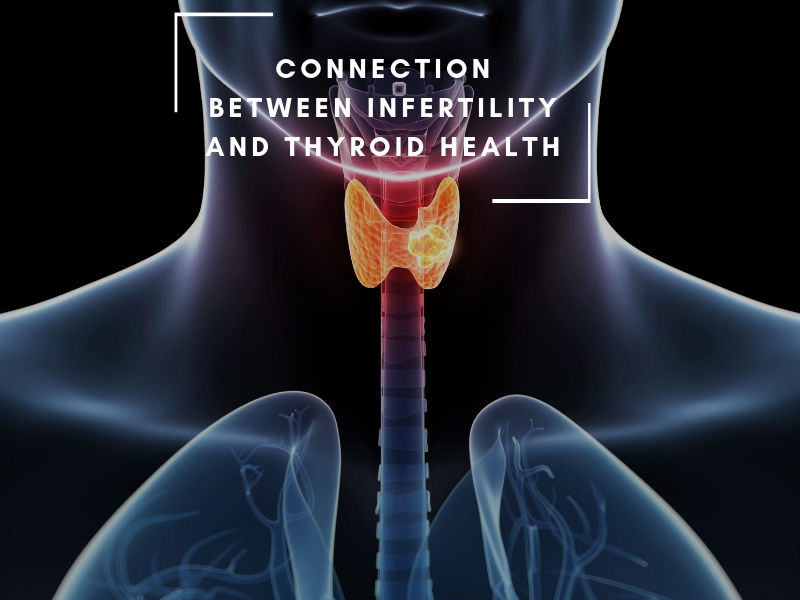Many women have a sense that there is something wrong with their thyroid health—they’re gaining weight despite a healthy diet, experiencing chronic fatigue or cold intolerance, losing hair, forgetting things, having trouble going to the bathroom, and feeling generally depressed—and yet no one has ever done a comprehensive thyroid evaluation on them.
The reason this is so frustrating? We know that thyroid disorders are incredibly common, affecting one in 10 women, and that about 60% of people with a thyroid problem are unaware of their condition—and thus, unable to manage it appropriately. This is particularly heartbreaking in the context of infertility, which may be a symptom of an unmanaged thyroid issue that conventional medical practitioners miss, thereby leading many women down a stressful path of potentially unnecessary fertility tests and treatments.
How an underperforming thyroid can affect fertility.
Hypothyroidism (or low thyroid function), especially the common autoimmune type called Hashimoto’s thyroiditis, is often missed as a hidden cause of infertility and miscarriage. The fact is, the thyroid affects our reproductive system in a big way. Thyroid hormones are important in the regulation of the menstrual cycle, and imbalances in these hormones can cause amenorrhea (no periods) or irregular cycles, impair ovulation (making it difficult to conceive), and affect progesterone levels (increasing the risk of miscarriage). And research supports this thyroid-fertility connection quite clearly: One study found that 76% of infertile women with hypothyroidism were able to conceive within six weeks to a year of receiving treatment for their thyroid condition.
It’s estimated that the prevalence of “subclinical hypothyroidism” (not quite full-blown hypothyroidism) in non-pregnant women of childbearing age is 4% to 8%, and these numbers likely underrepresent the problem. And knowing that you have high thyroid antibodies can be the first step in a holistic approach to increasing fertility—in the early stages of Hashimoto’s, the thyroid’s function may be variable and work well once a patient makes strategic lifestyle and dietary changes.
Yet, with the current infertility care model, doctors typically only treat hypothyroidism when the hormones are extremely off, not in the early stages when it could still affect your ability to conceive or maintain a healthy pregnancy.
Most women will have had their TSH levels tested at some point in their evaluation, but this number alone can miss many cases of Hashimoto’s. That’s because thyroid function is very erratic (or up and down) in the early stages of this condition—so TSH levels may actually be normal at the time of your test, even if thyroid function is compromised. This test can also miss cases of peripheral hypothyroidism, where the body is not creating enough active thyroid hormone (ft3) but has normal levels of TSH and T4. A full thyroid test panel, on the other hand, will identify these issues as early as possible, making it more likely that you’ll be able to manage them with lifestyle changes alone.
Even if your doctor does diagnose your thyroid as a potential factor in your fertility issues, another problem is that thyroid hormone treatment will not work as effectively in the setting of certain nutrient deficiencies such as iron, vitamin B12, folate, magnesium, zinc, and vitamin D—all of which are common in young women, especially those with digestive issues. In fact, many women with thyroid issues also suffer from constipation, diarrhea, acid reflux, and bloating—symptoms that can be related to an underlying microbiome disturbance as well as a result of the thyroid disease. This creates a vicious cycle in which gut health issues create an environment of increased autoimmunity, and thyroid changes make digestive issues and nutrient malabsorption worse. This is why I also test levels of the micronutrients mentioned above, which isn’t typically part of a fertility work-up.
Lifestyle changes to support your thyroid and promote fertility.
Our thyroids are only one part of a bigger interconnected endocrine system in which all of our hormones communicate with each other and try to maintain balance. So, how well thyroid hormone treatment works, should you need it, is dependent on getting your other hormones balanced, including insulin (which regulates blood sugar) and adrenal hormones (which govern your fight-or-flight response). The conventional medical system likes to focus on just one part of the body at a time, but when it comes to the fertility-thyroid connection, you have to zoom out and look at the body as a whole.
Working on improving gut health with dietary changes and eating in a way that calms down autoimmunity and keeps blood sugar stable should also be integral parts of a treatment plan to restore thyroid health. Many of my patients have been successful in improving their thyroid function and fertility with elimination diets, which often involve avoiding gluten, soy, dairy, processed sugar, and alcohol and instead focusing on eating a more organic, minimally processed, whole-foods-based diet. Helping the body get out of fight-or-flight mode with regular sleep, exercise, and working to reduce stress with acupuncture, yoga, and meditation can also promote healthy thyroid functioning.
The Center for Diabetes and Endocrine Care (CDEC) is a state-of-the-art patient-centered medical facility, achieving excellence in endocrinology for over 45 years. We can help! If you know someone that is unhappy with their thyroid care or that is still experiencing issues with their health, give us a call today at 954-963-7100.


Recent Comments